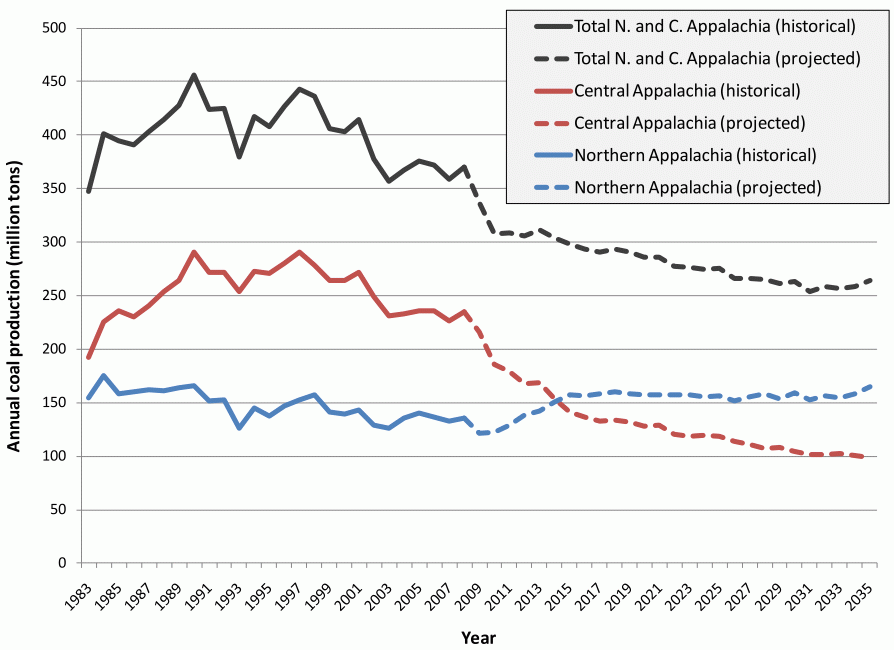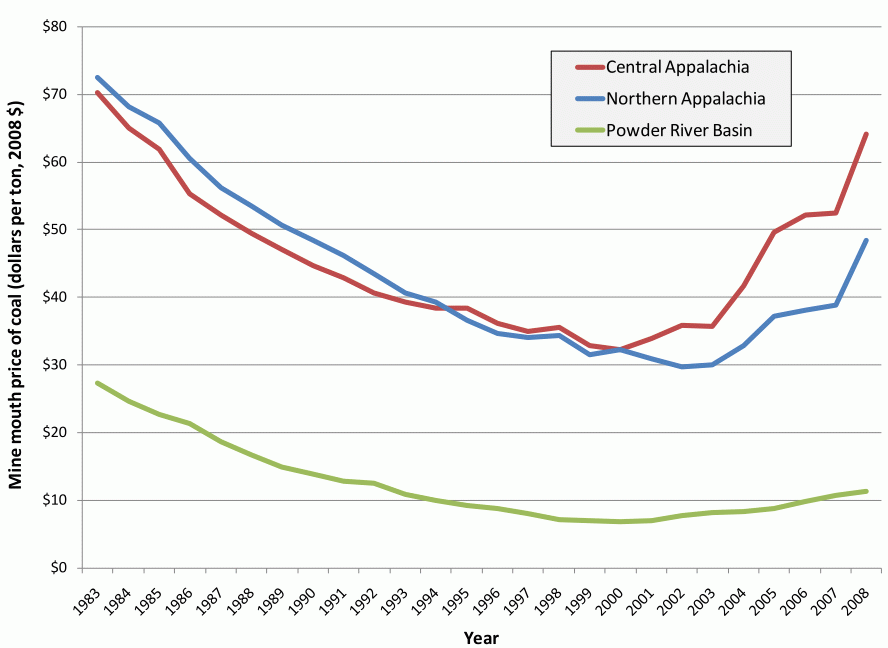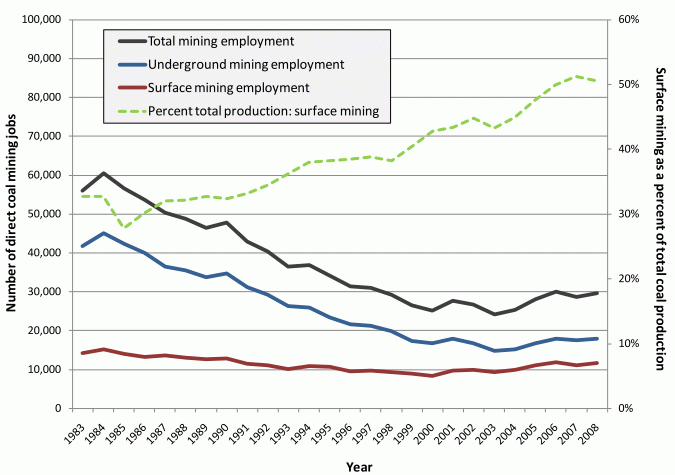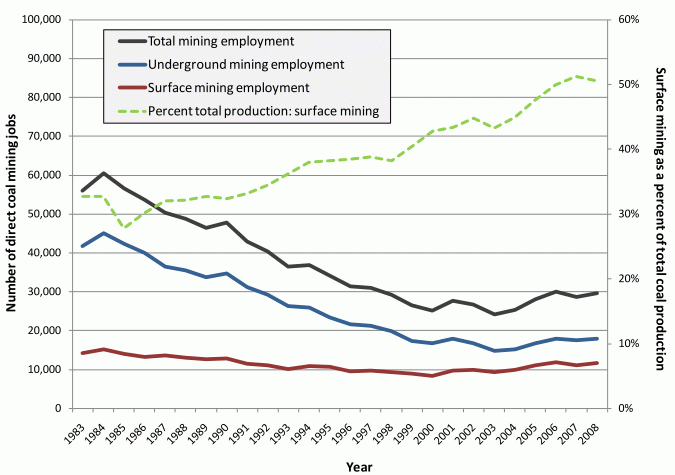In his extraordinary, unscripted dialogue with House Republicans last Friday, Obama had an interesting exchange with Rep. Shelley Moore Capito of West Virginia. It’s worth reprinting in full:
CONGRESSWOMAN CAPITO: Thank you, Mr. President, for joining us here today. As you said in the State of the Union address on Wednesday, jobs and the economy are number one. And I think everyone in this room, certainly I, agree with you on that.
I represent the state of West Virginia. We’re resource-rich. We have a lot of coal and a lot of natural gas. But our — my miners and the folks who are working and those who are unemployed are very concerned about some of your policies in these areas: cap and trade, an aggressive EPA, and the looming prospect of higher taxes. In our minds, these are job-killing policies. So I’m asking you if you would be willing to re-look at some of these policies, with a high unemployment and the unsure economy that we have now, to assure West Virginians that you’re listening.
THE PRESIDENT: Look, I listen all the time, including to your governor, who’s somebody who I enjoyed working with a lot before the campaign and now that I’m President. And I know that West Virginia struggles with unemployment, and I know how important coal is to West Virginia and a lot of the natural resources there. That’s part of the reason why I’ve said that we need a comprehensive energy policy that sets us up for a long-term future.
For example, nobody has been a bigger promoter of clean coal technology than I am. Testament to that, I ended up being in a whole bunch of advertisements that you guys saw all the time about investing in ways for us to burn coal more cleanly.
I’ve said that I’m a promoter of nuclear energy, something that I think over the last three decades has been subject to a lot of partisan wrangling and ideological wrangling. I don’t think it makes sense. I think that that has to be part of our energy mix. I’ve said that I am supportive — and I said this two nights ago at the State of the Union — that I am in favor of increased production.
So if you look at the ideas that this caucus has, again with respect to energy, I’m for a lot of what you said you are for.
The one thing that I’ve also said, though, and here we have a serious disagreement and my hope is we can work through these disagreements — there’s going to be an effort on the Senate side to do so on a bipartisan basis — is that we have to plan for the future.
And the future is that clean energy — cleaner forms of energy are going to be increasingly important, because even if folks are still skeptical in some cases about climate change in our politics and in Congress, the world is not skeptical about it. If we’re going to be after some of these big markets, they’re going to be looking to see, is the United States the one that’s developing clean coal technology? Is the United States developing our natural gas resources in the most effective way? Is the United States the one that is going to lead in electric cars? Because if we’re not leading, those other countries are going to be leading.
So what I want to do is work with West Virginia to figure out how we can seize that future. But to do that, that means there’s going to have to be some transition. We can’t operate the coal industry in the United States as if we’re still in the 1920s or the 1930s or the 1950s. We’ve got to be thinking what does that industry look like in the next hundred years. And it’s going to be different. And that means there’s going to be some transition. And that’s where I think a well-thought-through policy of incentivizing the new while recognizing that there’s going to be a transition process — and we’re not just suddenly putting the old out of business right away — that has to be something that both Republicans and Democrats should be able to embrace.
As usual, these comments are something of a Rorschach blot. On one hand, it’s easy to be irritated that, just as in the State of the Union the other night, Obama’s manages to discuss “clean energy” at length without making any mention of wind, solar, geothermal, or even biomass. Instead it’s all about nukes, coal, oil, and gas.
Then again, all the fossil talk can be seen as a spoonful of sugar to make the medicine go down, and the medicine is in the last paragraph: WV will have to make a transition. It can be a gentle transition rather than an abrupt one, but it’s got to happen.
But is the president delivering that message bluntly enough? And are West Virginians and other coal-dependent folk hearing it? Is the talk of “clean coal” and “increased production” creating a false sense of security?
When he said “I am in favor of increased production,” Obama was probably talking about oil and gas production — the offshore stuff he cited in the SOTU — but he followed it with, “I’m for a lot of what you said you are for.” What Capito would like is more coal production, and that’s not going to happen. A January report from Downstream Strategies, “The Decline of Central Appalachian Coal and the Need for Economic Diversification” (PDF), makes the point pretty clearly:
 Downstream Strategies
Downstream Strategies
Coal production is on the wane in Appalachia; it’s shifting to low-sulfur coal from the Powder River Basin. Here’s a look at their comparative prices:
 Downstream Strategies
Downstream Strategies
Just as production has been declining, so too has employment:
 Downstream Strategies
Downstream Strategies
Notice two things: the percentage of coal coming from surface mines — and in Central Appalachia that increasingly means mountaintop-removal mines — has increased sharply. It’s been enough to prompt a slight rebound in jobs, back up to 30,000. This can be seen as a kind of last-minute binge: With the easy coal seams increasingly mined out and the EPA cracking down on mountaintop removal, it’s hard to see how employment is sustained even at these diminished levels.
(For a closer look at the report, read this piece from Ken Ward Jr.)
In short, coal production is a rapidly declining source of jobs and economic vitality in West Virginia. Here’s what Obama would have said to Capito in my fantasy political world:
“I recognize and honor the fact that coal has supported West Virginian families for generations; those mining families deserve our thanks and gratitude. But coal is on the wane in Central Appalachia. Production is projected to decline and employment is down by half since the early ’80s. There’s little that can be done to reverse these trends, even if I shut the EPA down tomorrow and passed no further energy policies. That’s something West Virginia’s leaders and citizens alike are going to have to come to grips with. The sooner they do, the sooner they’ll be willing to join my administration in passing policies that can accelerate the transition to the clean energy economy of the 21st century. West Virginia is in for a bumpy transition and the nation owes them help getting through it; the sooner it begins, the gentler it will be.”
And then he would have flown away on the back of a unicorn, in a puff of fairy dust.



